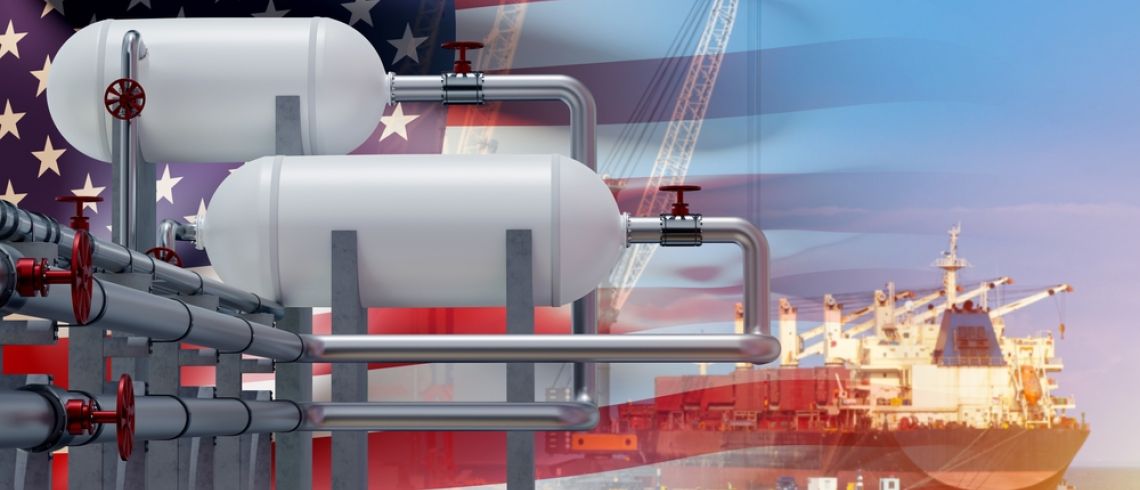The US has taken the global lead as the world’s top LNG exporter but its ability to hang onto that crown hangs in the balance.
Its latest challenge is a review by the Biden administration to reconsider the current process under which permits are granted for LNG projects, triggered by environmental campaigners, who are urging an accelerated pullback from the world’s reliance on fossil fuels.
Here’s a quick take on what this means, with views from leading sector leaders – and what’s next.
Why is the US leading on LNG?
While the country’s first LNG cargo was shipped in 2016 on the development of its shale gas resources, it was the event of Russia’s invasion of Ukraine, and the sanctions to sharply cut off Russian gas to Europe, that thrust it into becoming a leading supplier.
With estimates of around 90 Mt, it knocked Qatar from the lead, as the world’s largest exporter. In total, across the globe, US LNG projects account for nearly 40% of around 200 Mtpa of projects under construction.
What’s at stake?
US companies investing in LNG are generally the most attractive for investors that eye up the energy sector, due to access to Wall Street’s strong bond markets, underpinned by a robust financial infrastructure and overall bullish attitude to investments in fossil fuels.
But the latest moves could disrupt that picture. Most immediately, there are hints that the review could potentially trigger project delays. In addition, the suggestion of delaying projects would likely threaten the shareholder view of the industry’s prospects.
In an industry which relies on planning and certainty, for decades at a time, the notion that a new direction of policy would gum up FIDs and overall, enforce costlier stricter climate standards, is likely to get fierce pushback from the multibillion dollar sector.
READ US LNG takes the crown. What next?
Tim Tarpley, president of industry trade group US Energy Workforce & Technology Council, told Gas Matters Today that any move to create new hurdles to permitting LNG projects would be “counterproductive and could send the industry into disarray”.
“The last thing that natural gas needs is more regulatory uncertainty. Already, the industry is forced to play a 'will they, won’t they' game with stalled permitting reform. This proposal only exacerbates the problem by stalling new projects and halting an industry that is fueling not only our homes this winter but those of our friends and allies abroad,” Tarpley said.
The sentiment the review sends to potential investors is also jarring the industry.
“These actions from the Administration only discourage investors who are drawn off by regulatory uncertainty. This is not the first time that we have seen the Administration's slow-walk decisions (offshore leases, for example), and this is yet another attempt to keep their political base happy,” Tarpley said.
Do climate change campaigners have a point?
COP 28, held in Dubai, ostensibly provided a tangible sense of momentum, as it was the first step-back look since the 2015 Paris agreement, at COP 21.
The most significant takeaway was the recognition by all stakeholders of the need to shift away from fossil fuels (in a way that is just, orderly and equitable), and accelerate towards winding down unabated coal power.
The gas industry, on the back of this, has emerged as the bridging fuel to that final aim, with – in other words, oil and gas majors accept they need to switch focus to developing gas for economic needs to ‘keep the lights on’ while continuing on the path to transitioning to low emission and renewable sources of energy.
READ COP 28 – a good outcome for the gas industry
But this may not be enough for certain quarters of anti-fossil fuel campaigners who are ramping up efforts to oppose LNG projects.
In October, US environmentalist Bill McKibben – reknowned for blocking key oil pipeline Keystone XL – raised questions at a press conference over estimated greenhouse gas emissions of Venture Global’s CP2 project in Louisiana. He said it was 20 times that of Alaska’s recently cancelled Willow oil project. However, Bloomberg reported he could not provide details of the calculation at the same event.
McKibben, who is followed by more than 397,500 people on X (formerly Twitter) earlier this month took to the social media platform to re-post and send out messages challenging the sector again.
"Big Oil is trying to defend its absurd LNG buildout on the grounds that it is defending Ukraine. There's already more than enough gas for Europe--as Ukrainian energy expert (and climate hero) @SvitlanaRomanko points out here,” he said on 10 January.
The issue seems a little too political – so why are LNG companies in the US worried?
Tarpley points out that from an international perspective, Europe has already determined that natural gas is a “green” form of energy.
“So why wouldn’t the US follow suit? We are economically handicapping ourselves to increase red tape on a resource that the world wants and desperately needs. Uncertainty created by this statement will encourage our allies to look for LNG from the Middle East, Australia, and South America who will be more than happy to fill the void we leave.
“Further, this uncertainty threatens our national security and that of our allies. With Russia’s continued aggression in Ukraine and increasing instability in the Middle East, our allies are in dire need of a reliable and dependable source of energy,” Tarpley notes.
Some, like American Petroleum Institute CEO Mike Somers, are calling for attention on the huge risks that issues like the current Gaza conflict might behold for global energy markets. Currently, this is playing out with several LNG tankers being diverted and turning around to the Cape of Good Hope to make their deliveries instead of passing through the high-risk Suez Canal where daily battles are playing out with Houthi rebels.
Noting the 1973 war in Israel, Somers on 10 January reminded an audience at an API campaign how the US rushed to aid Israel, prompting OPEC to block oil exports to the US.
“Prices went through the roof. Gas lines extended for blocks. It led to a decades-long stretch in which every president irrespective of party called for greater American energy independence and invested in US energy capabilities. Until now,” he said.
He warned Washington is “on the cusp of spoiling America’s energy advantage —undermining it with short-sighted policies and hostility toward US oil and natural gas”.
Could the review impact long-term commitments from US companies?
New York-based industry analyst and lawyer, Irina Tsukerman, noted that most LNG in production is for export on a contractual basis, Tsukerman said the US is committed to long-term delivery of its products, “which means that new permits for distribution have to take into consideration that the US is already committed to certain long-term production quotas, and therefore it cannot disrupt them.
“So, all of this, whatever is set in motion now, will have to be very much, very long term,” Tsukerman told Gas Matters Today.
What’s next?
Depending on the outcome of the energy department’s review, there may be a host of new reporting requirements ahead to pass more stringent climate tests for approval of LNG projects.
Tsukerman said that nothing is a hundred percent decided yet. “There’s a lot of ambiguity about what exactly will happen, where and how,” she told Gas Matters Today.
Noting the general trend for US energy policy heading for stronger regulatory frameworks, Tsukerman said it may be likely more ESG reporting requirements and stricter emissions standards could follow.
"In all these permits going forward, we’ll likely see some restrictions on the where and when of the LNG development. There's been a very strong tendency towards anti-fracking in certain states. But the US is emerging as one of the leading producers of LNG around the world. So no matter how restrictive, there is a desire to be environmentally friendly ... the US also has to balance its broader commitments and geopolitical interests,” she said. - PS
Subscription Benefits
Our three titles – LNG Business Review, Gas Matters and Gas Matters Today – tackle the biggest questions on global developments and major industry trends through a mixture of news, profiles and analysis.
LNG Business Review
LNG Business Review seeks to discover new truths about today’s LNG industry. It strives to widen market players’ scope of reference by actively engaging with events, offering new perspectives while challenging existing ones, and never shying away from being a platform for debate.
Gas Matters
Gas Matters digs deep into the stories of today, keeping the challenges of tomorrow in its sights. Weekly features and interviews, informed by unrivalled in-house expertise, offer a fresh perspective on events as well as thoughtful, intelligent analysis that dares to challenge the status quo.
Gas Matters Today
Gas Matters Today cuts through the bluster of online news and views to offer trustworthy, informed perspectives on major events shaping the gas and LNG industries. This daily news service provides unparalleled insight by drawing on the collective knowledge of in-house reporters, specialist contributors and extensive archive to go beyond the headlines, making it essential reading for gas industry professionals.





